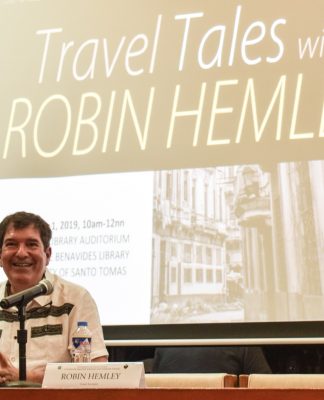 I WAS NOT yet a fan of poetry when I entered college, and so I got only acquainted with the name Ophelia Dimalanta when I shifted to AB Journalism in 2007.
I WAS NOT yet a fan of poetry when I entered college, and so I got only acquainted with the name Ophelia Dimalanta when I shifted to AB Journalism in 2007.
I could not recall the first time I read her name, was it in a Varsitarian article? Or was it during my encounter with LIT102? I could hardly remember.
After being quite intrigued by her poem “Finder Loser,” I tried google-ing her name to know more about her profile (I often do such when I encounter a writer that put me in amazement, like when I chanced upon Jessica Hagedorn’s Leopard and Ronald Baytan’s poems), and so I found out that she was once a former Faculty of Arts and Letters dean.
When I was not yet member of the Varsitarian staff, I would usually read her being quoted in the paper about literary issues like the dwindling number of Thomasians winning the Palanca literary prize and the closure of research centers that included the Center for Creative Writing and Studies where she was the director.
There were times that I planned to attend some seminars at the Graduate School where she was set to deliver talks or speeches. Even when I was already part of the Varsitarian, I always wanted to meet her since she was a former staff member, too. But I deliberately skipped my chances to meet her due to my other engagements, and knowing that Ma’am Ophie would always be there. She would always be there at her office at St. Raymund’s Building. She would always be there when there are literary conferences in UST that I would surely attend if my schedule permits me. She would surely be there on the Valik Varsi alumni homecoming on December 11. Because in that event, I intend to invite her to be one of our guest columnists in the Varsitarian quadricentennial supplement. I just thought that she would always be there. Or quoting former Varsitarian editor in chief and actor Bernardo Bernardo’s Facebook comment: “We just felt that she was going to live forever.” I regret that I wasn’t able to meet Ma’am Ophie personally.
Condolences to the family of Ma’am Ophie, and to all Thomasian writers who lost a “mom.”
***
Last November 23, the “Maguindanao Massacre” that killed 57 people, including 32 journalists, turned a year old. But 365 days after the worst single attack to journalists, we have not seen justice. What we have seen is the slow judicial process, what we have seen is the government’s incompetence for a thorough investigation on the case, what we have seen is the culture of impunity remained in some parts of Mindanao. President Aquino earlier vowed to hold the murderers accountable for the massacre and to dismantle private armies by powerful clans. But where is the case now? And where is it going?
Condolences to the family of the civilians and journalists killed at the November 23, 2009 Maguindanao carnage.
***
Last November 15, the University suddenly called for a suspension of classes at around three in the afternoon due to the strike of bus groups in a protest against the number coding scheme. The scheme was made in a bid to ease the traffic in Metro Manila, but apparently, bus drivers and operators, who are the frequent lawbreakers by illegally loading and unloading bus passengers in prohibited areas, could not understand it. And so last November 15, 70 percent of the buses plying in the metropolis reportedly took part to the strike and left the public stranded in the streets.
Condolences to the riding public, for we have such kind of public vehicles that are ready to leave us hanging when their profit is at stake.

















